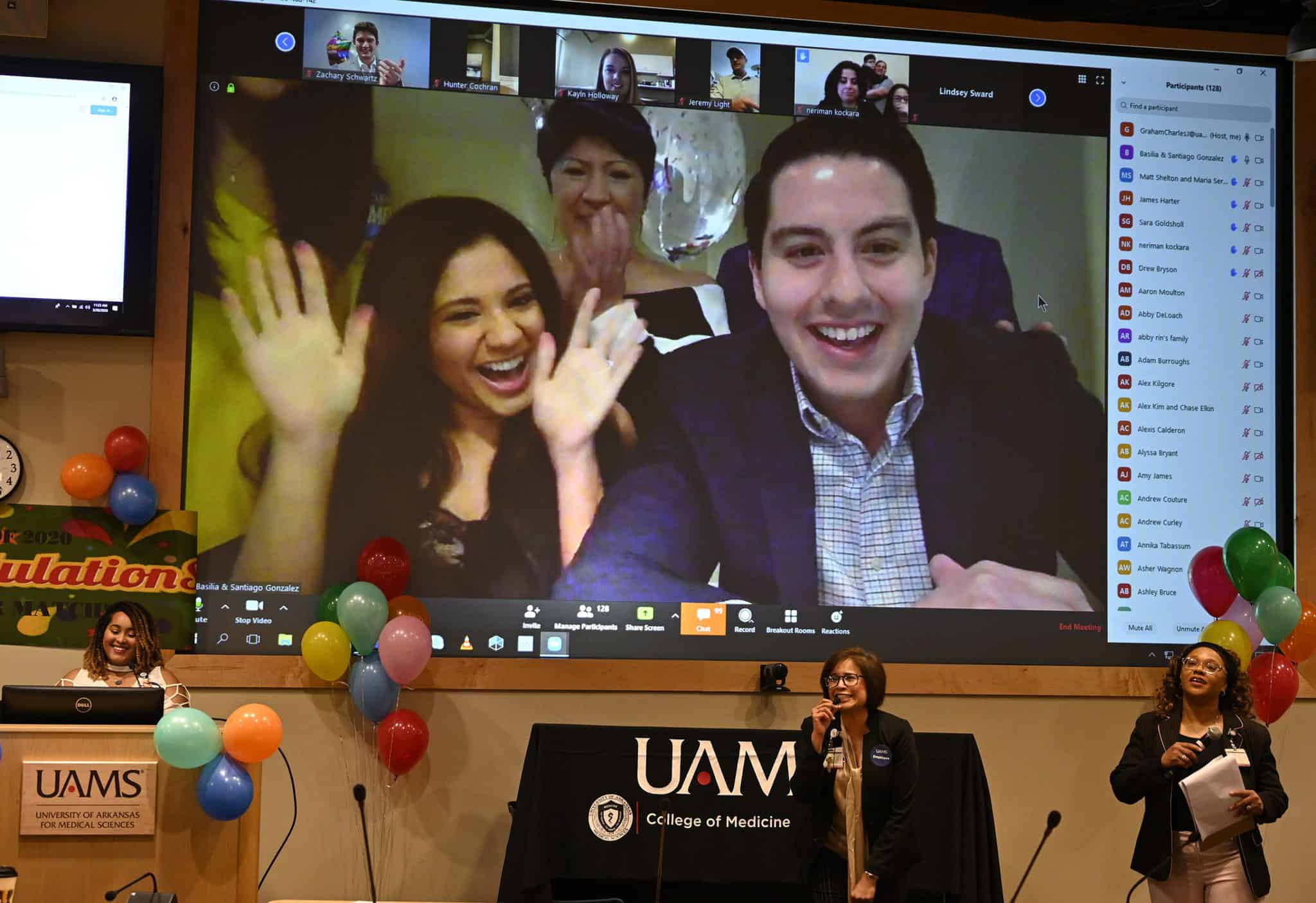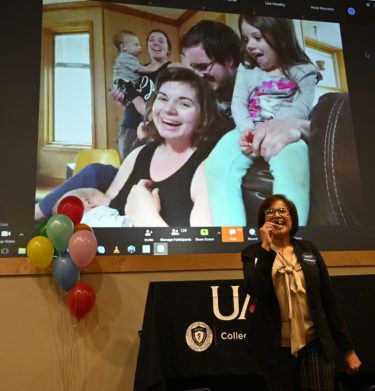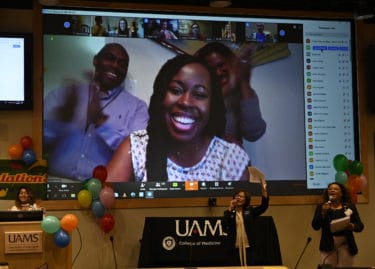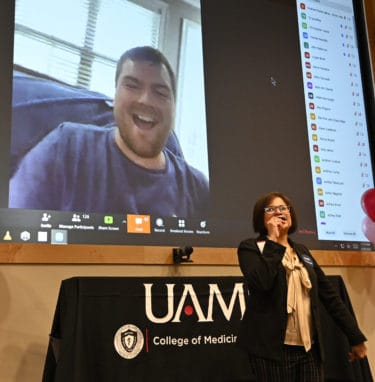Match Day Goes Virtual: COVID-19 Changes, but Can’t Stop Spirit Behind COM Celebration
| Match Day is always bittersweet, but the Class of 2020 tried to emphasize the sweet over the bitter at this year’s celebration despite the swirling context of a global pandemic and its unprecedented disruptions to daily life.
There were still tears — but they were tears of joy, accomplishment and hard work paid off. And instead of sharing the moment in a large room surrounded by friends and family as is Match Day tradition, they shared them virtually in an online meet-up that involved more than 900 people simultaneously and quickly garnered more than 6,000 views.
“I know things haven’t turned out as we planned, but we are so thankful that 124 of you have joined in, and we’re going to celebrate this huge achievement,” Sara Tariq, M.D., associate dean for student affairs in the College of Medicine, said to a gigantic screen covered in dozens of student screens at once. “We’re here to celebrate each and every one of you. And I’m here to tell you, when we saw your faces — we were crying to see your faces. I’m so happy and gratified to see each of you.”
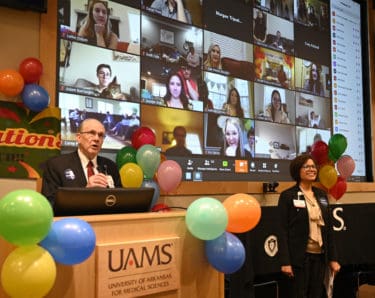
Christopher T. Westfall, M.D., UAMS executive vice chancellor and College of Medicine dean, speaks to the students, who are pictured in the live video conference behind him.Amy Widner
Match Day is an annual event in which fourth-year medical students across the nation simultaneously open envelopes revealing their “match” — or where they have been accepted to continue their training in a specialty residency for the next three to seven years.
In-person classes at UAMS were suspended March 12 and large gatherings postponed in an effort to stop the spread of the highly contagious novel COVID-19 respiratory illness. Many of the students have been isolated or semi-isolated at home since. It has been a time of stress and uncertainty for all.
“I think we need to pause to reflect on the fact that it’s never been more clear the difference you’ll be able to make for the people of your community and the people of this state and nation,” said James Graham, M.D., executive associate dean for academic affairs. “It is very obvious that the field you’ve chosen can really, really make a difference in the coming days.”
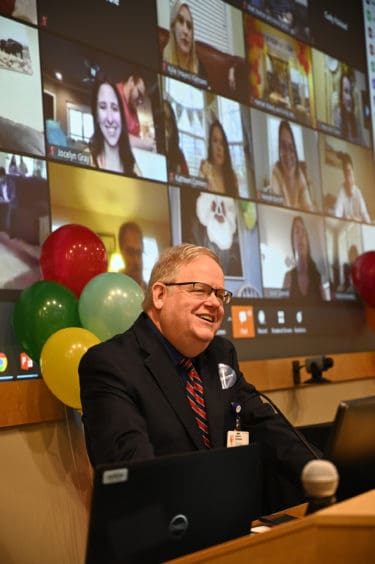
James Graham, M.D., executive associate dean for academic affairs, speaks to the students.Amy Widner
Within that context, Tariq, Graham and other College of Medicine staff scrambled to transfer many activities online for the students, from classes to forms to Match Day itself. They used a video conference account to allow the students to connect with each other and with a room at UAMS where Tariq and staff read out the names. The event was streamed via Facebook Live so that family, friends and faculty could still tune in.
“I suspect that this will be more memorable than any other Match Day,” said Christopher T. Westfall, M.D., UAMS executive vice chancellor and College of Medicine dean.
“I’d also like to thank you because of the adjustments we’re making as we look at COVID-19. I have seen a tremendous response, and not only from our faculty and our residents, but the students have really stepped up to the plate with acts of volunteerism. I urge you over the next few months to learn everything you can about this virus and how to take care of these patients, because you’re going to be the front line. I have every confidence that this will be your and our finest hour.”
Ninety-six percent of the students who participated were placed into residency programs. Forty-three percent are staying in Arkansas for their training, where studies show they are likely to remain to practice medicine. Forty-five percent are going into primary care fields such as family medicine, internal medicine, pediatrics and obstetrics and gynecology.In total, 161 students participated in the match, 155 matched into a residency and six were left unmatched. They have the option to participate in subsequent attempts to match students with any remaining residency slots. Sixty-six are remaining in Arkansas. Seventy are going into primary care. General surgery (14), psychiatry (13) and anesthesiology (10) were also popular specialties. In addition to the UAMS seniors who participated in NRMP, 11 received residencies in early matches (military, ophthalmology and urology).
Some of the students were surrounded by friends and family who celebrated with them, others celebrated with pets, or made light of the fact that they were alone. Jordan Fielding, who was elected by his peers to speak to the class, joked about not being able to hear them laugh at his jokes, “but honestly, it probably wouldn’t be much different” and — alone when it came time to announce his match — hugged a hand puppet in lieu of actual human contact.For many couples, the stakes were extra high on Match Day because they hope to both match in a geographically similar location or face the pressure of one member of the partnership taking a less-than-ideal post.

Joseph Levy was the last name to be called, so he got a $300 prize, as is tradition at Match Day.Amy Widner
Santiago and Basilia Gonzalez met the first week of medical school during one of the welcome-week activities. It was love at first sight, and they married 11 months later in the summer between their first and second years of school.
“During medical school, your partner understands exactly what you are going through at a level that no one else does, and since both of you have the same goal, it is much easier to focus on succeeding at that goal together rather than being pulled in different directions,” Santiago said. “However, it was a challenge going through interview season and ranking programs for couple’s matching. At the end of the day, we are thankful for these challenging experiences because they helped us improve our ability to solve problems, to communicate more effectively, and to grow as a stronger couple prepared to face future challenges.”
They were delighted on Match Day to both find residencies near each other in California.
Other students, like Logan Beville, felt extra lucky to make it through medical school. Two weeks into his second year, doctors found a brain mass that turned out to be benign and was correctable with surgery.
“It is so exciting to finally reach this day,” Beville said. “I remember being told about this day four years ago, and it seems so surreal that it is finally here.”
Beville matched into a family medicine residency in Jonesboro.
The 2020 Main Residency Match was the largest in NRMP history. A record-high 40,084 applicants submitted program choices for 37,256 positions, the most ever offered in the match. The number of available first-year (PGY-1) positions rose to 34,266, an increase of 2,072 (6.4%) over 2019. The increase in positions was due, in part, to the last migration of osteopathic program positions into the Main Residency Match. This was the first year both M.D. and D.O. programs participated in the same match process.
